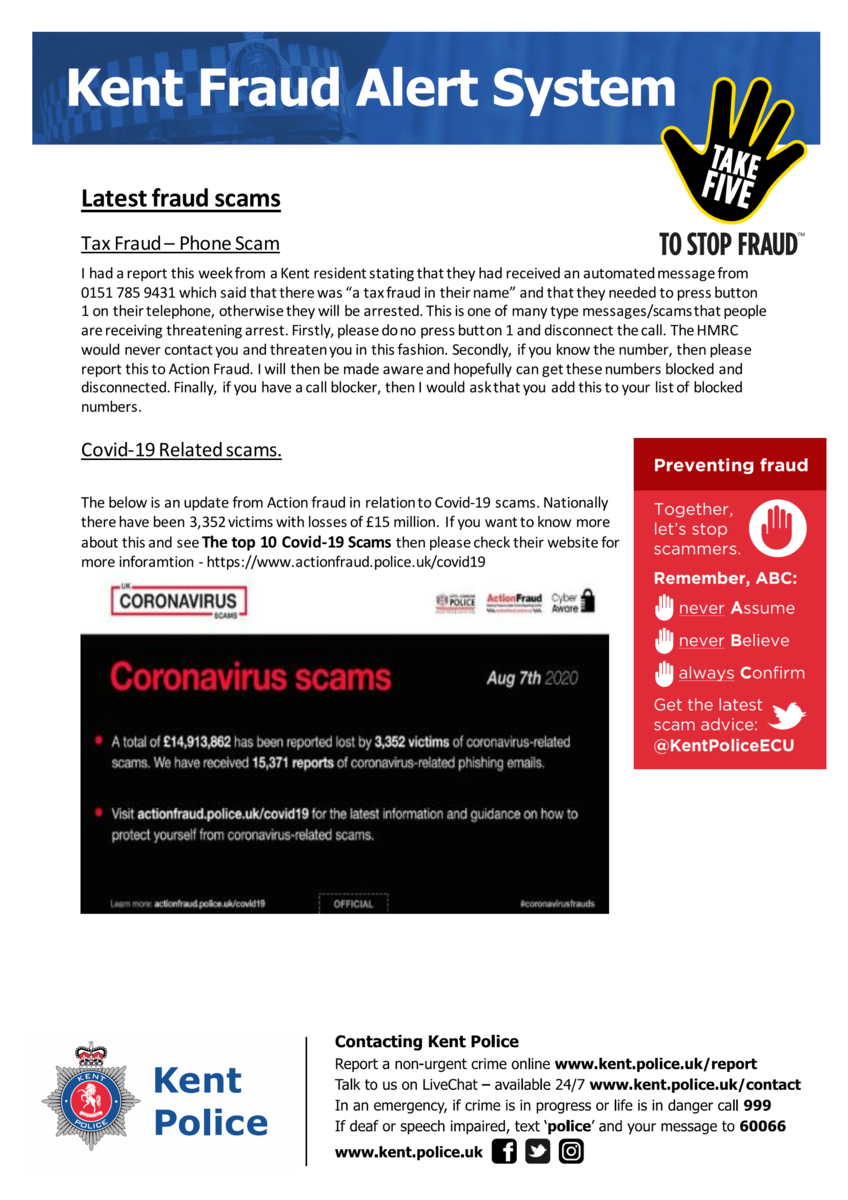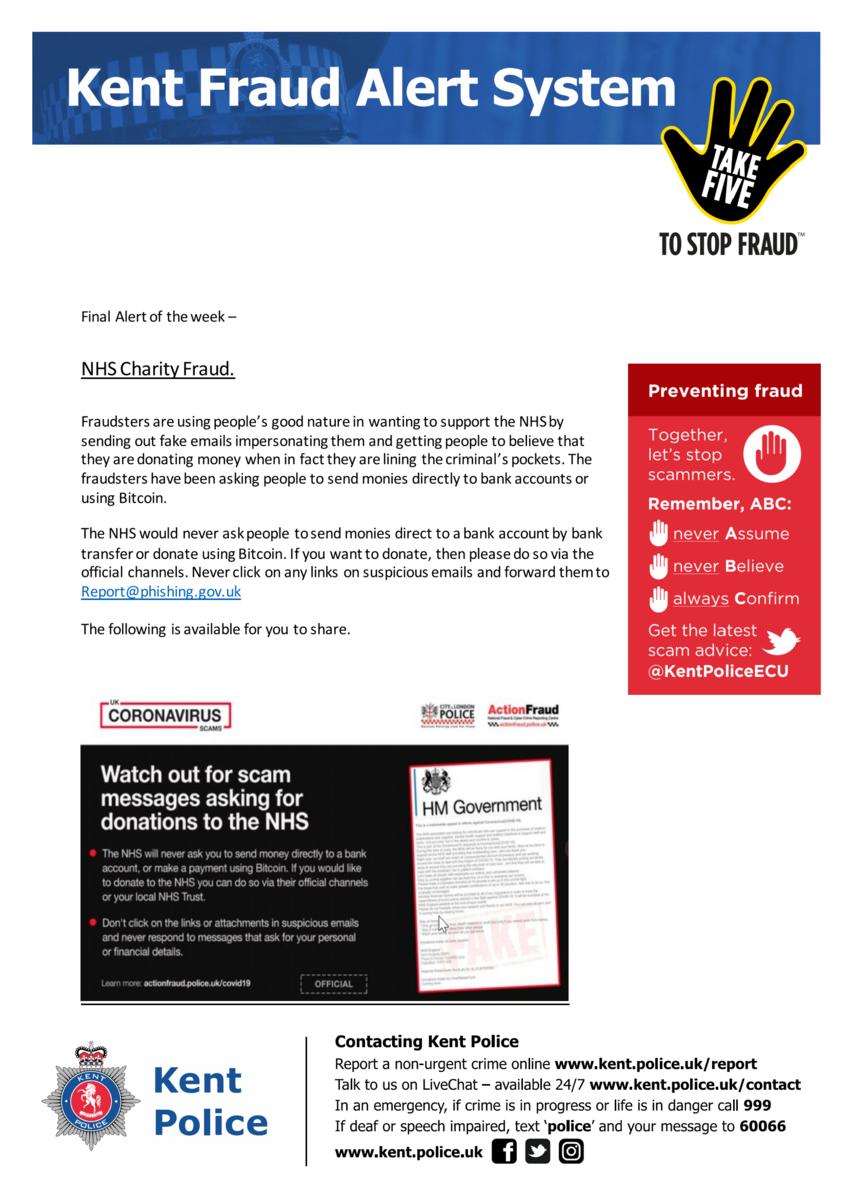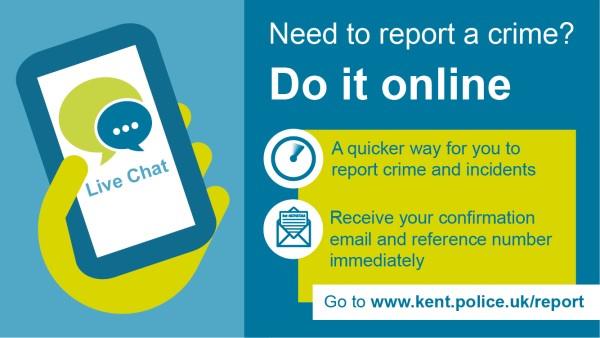Police Matters, Scams etc
Get Safe Online
Website contains lots of useful tips and up-to-date online safety advice and can be accessed at: www.getsafeonline.org
Alternatively, a monthly newsletter is published that provides tips and the latest advice on how to stay safe online, as well as highlighting any particularly prevalent scams to look out for. If you would like to sign up for this, please feel free to at:
https://www.getsafeonline.org/subscribe-to-our-newsletter/
--------------------------------------------------------------------------------------------------
Over 12 million suspicious emails reported by the public
What is phishing and how does it work?
You wouldn’t let a thief enter your home, but what if the thief was masquerading as someone familiar, such as a postman, and tricked you into opening the door? Phishing works in a similar way - criminals impersonate trusted organisations by creating legitimate-looking messages and websites in order to trick people into opening the doors to their personal information. Once criminals have this information, it can be used to perpetrate fraud and cyber against you, or in your name.
How big is the problem?
Phishing attacks are a common problem faced by both individuals and businesses on a daily basis.
As of 31st May 2022, the National Cyber Security Centre’s Suspicious Email Reporting Service (SERS) has received over 12mn reports from the public, and has removed over 83,000 scams and 153,000 malicious websites. The most impersonated organisations in phishing emails reported last year were the NHS, HMRC and GOV.UK.
Most phone providers are part of a scheme that allows customers to report suspicious text messages for free by forwarding it to 7726. When a text is reported to 7726, the provider can investigate the origin of the text and arrange to block or ban the sender, if it’s found to be malicious. As of May 2022, 13,000 scams have been removed as a result of suspicious text messages reported using the 7726 service.
How can you protect yourself from phishing scams?
Most of the phishing scams reported to us have one thing in common, they started with an unexpected email or text message. Whether it’s an email asking you to “verify” your bank account details, or a text message claiming you’ve been in close contact with someone that’s got COVID, the goal of a phishing attack is usually the same - to trick you into revealing personal and financial information.
Here’s some simple advice you can follow when it comes to dealing with phishing scams:
1 - If you have any doubts about a message, contact the organisation directly.
Don’t use the numbers or address in the message – use the details from their official website. Remember, your bank (or any other official source) will never ask you to supply personal information via email.
2 - If you think an email could be a scam, you can report it by forwarding the email to: report@phishing.gov.uk. Send us emails that feel suspicious, even if you're not certain they're a scam - we can check.
3 - Most phone providers are part of a scheme that allows customers to report suspicious text messages for free by forwarding it to 7726. If you forward a text to 7726, your provider can investigate the origin of the text and arrange to block or ban the sender, if it’s found to be malicious.
4 - If you’ve lost money or provided personal information as a result of a phishing scam, notify your bank immediately and report it to Action Fraud: www.actionfraud.police.uk
For more advice on how to protect yourself online, visit: cyberaware.gov.uk
----------------------------------------------------------------------------------------------------------
Going on Holiday?
As travel restrictions become more relaxed, Action Fraud, the national reporting centre for fraud and cybercrime, is warning the public to remain vigilant against holiday fraud when booking flights or accommodation online.
In the financial year 2021/22, Action Fraud received 4,244 reports of holiday and travel related fraud – a substantial increase of over 120% when compared to the previous financial year.
Victims reported losing a total of £7,388,353 – an average loss of £1,868 per victim.
Tops tip to avoid falling victim to holiday fraud
- Stay safe online: check the web address is legitimate and has not been altered by slight changes to a domain name – such as going from .co.uk to .org.
- Do your research: don’t just rely on one review – do a thorough online search to ensure the company is credible. If a company is defrauding people, there is a good chance that consumers will post details of their experience, and warnings about the company.
- Look for the logo: check whether the company is an ABTA Member. Look for the ABTA logo on the company's website. If you have any doubts, you can verify membership of ABTA online If you're booking a flight as part of a package holiday and want more information about ATOL protection, or would like to check whether a company is an ATOL holder.
- Pay safe: wherever possible, pay by credit card. You should avoid paying directly into a private individual’s bank account.
- Check the paperwork: you should study receipts, invoices and terms and conditions, and be very wary of any companies that don’t provide any at all. When booking through a Holiday Club or Timeshare, get the contract thoroughly vetted by a solicitor before signing up.
- Use your instincts: if a deal sounds too good to be true, it probably is.
Link: New warning issued as reports of holiday fraud skyrockets by more than 120% | Action Fraud
-------------------------------------------------------------------
Tips on how to avoid impersonation fraud: https://vimeo.com/547456268
-------------------------------------------------------------------
Action Fraud has received 752 reports in four days relating to fake emails purporting to be from Ofgem. The emails state that the recipient is eligible for a rebate as a result of a newly announced government scheme. The links in the emails lead to genuine-looking websites that are designed to steal your personal and financial information.
Please view our tweet to see a screenshot of the fake emails reported to Action Fraud: https://twitter.com/CyberProtectUK/status/1527657160586444800?s=20&t=RdAiopW83gUlsAymvjnu5g
- Remember, your bank, or any other official organisation, won’t ask you to share personal information over email or text. If you need to check that it’s a genuine message, contact the company using details from their official website or app.
- Spotted a suspicious email? Forward it to the Suspicious Email Reporting Service (SERS) - report@phishing.gov.uk
--------------------------------------------------------------------------------------------
Security warning after fraudulent calls reported in Canterbury and Thanet
Residents in Thanet and Canterbury are being reminded to be wary following reports of attempts to obtain money by people posing as police officers.
On Monday 21 March 2022, a resident in Canterbury lost a quantity of money after he became a victim of a scam. He was called by someone pretending to be a police officer from Watford, who said they had a woman in custody with a large amount of cash and accused the resident of supplying the woman with the money.
In order to clear his name, the victim was convinced by the caller that he should withdraw money from his own bank account which was then collected by a courier the same day.
Similar calls were made to residents in Broadstairs and Birchington on Tuesday 22 March, although on those occasions, the residents ended the calls and refused to confirm any personal details. During these calls, the conmen pretended to be officers from Milton Keynes and Paddington.
Inspector Guy Thompson from the Canterbury Community Safety Unit said: ‘Be alert to any callers who make contact by phone and say they work for the police and require you to hand bank cards or money to a courier.
‘Often, these conmen will try and alarm you by saying there has been fraudulent activity on your bank account, or they have arrested someone using a cloned card in your name. Their purpose is to win your trust by sounding very plausible, and then convincing you they are helping to keep your cash safe.
‘A police force will never ask a member of the public for their bank details or money over the phone and if you receive one of these calls end it immediately.’
Further advice:
• Never hand over any money, or other items, to a courier after receiving this type of call.
• If you are not confident a person claiming to be a police officer is genuine, ask to take their details and then end the call.
• Wait for at least five minutes for the call to clear and then contact 101, or 999 in an emergency. A call handler will be able to verify whether your caller was genuine.
Anybody with information regarding these incidents is urged to call Kent Police on 01843 222289 quoting reference 46/54019/22.
You can also contact Action Fraud on 0300 123 2040, or report suspicious activity online by visiting their website.
The matter can also be reported to Crimestoppers, anonymously, on 0800 555111 or by using the online form.
----------------------------------------------------------------------------------------------------------------------------------------------------------------------------------
Take Five is a national campaign that offers straight forward & impartial advice that would help prevent you becoming a victim to various types of fraud and scams carried out online and by phone.
Click the following link to take you to their website:
https://www.takefive-stopfraud.org.uk/
-----------------------------------------------------------------------------------------------------------------------------------------------------------------------------------
Research shows two thirds (67%) of people are worried about their home being broken into, yet there are simple, proven measures we can all take to reduce our chances of becoming a victim of burglary by up to 50%.
To help you be and feel safer at home, we are running our Think WIDE(N) burglary prevention campaign (1st-31st March), highlighting the simple, evidence-based WIDE measures which can be taken in any home on a variety of budgets.
At Neighbourhood Watch, we also believe neighbours keeping an eye out for each other is key to reducing burglary, so we've extended the WIDE acronym to WIDE(N):
- W: WINDOWS: Keep your windows locked
- I: INTERIOR: Put inside lights on a timer/smart bulb
- D: DOORS: Double or deadlock your doors
- E: EXTERIOR: Put outside lights on a sensor
- (N): NEIGHBOURS: Keep an eye out for your neighbours
To learn more about WIDE(N) and burglary prevention measures, visit ourwatch.org.uk/thinkwiden.
----------------------------------------------------------------------------------------------------------------------------------------------------------------------------------
Rural crime has no set definition, however it can be very broadly classified as any crime and anti-social behaviour occurring in rural areas. We want to raise awareness of rural crime across our networks. We feel it is vitally important that rural and farming communities should highlight the issues that they deal with and how Neighbourhood Watch can help.
Make sure your animals are chipped or tagged to make them identifiable in case they escape.
• Use capped or inverted hinges on field gates to prevent easy removal.
• Regularly check gates and boundaries for signs of tampering.
Secure gates with good quality chains and padlocks that are more difficult to open.
Click on the below link for further info:
www.ourwatch.org.uk/rural-crime
----------------------------------------------------------------------------------------------------------------------------------------------------------------------------------
Are you at risk of being used as a Money Mule?
Criminals are targeting younger people through Snapchat and Instagram promising that they can make hundreds of pounds in minutes by becoming a money mule. Although it might appear to be a stress-free get rich quick scheme, acting as a money mule is illegal and could be funding serious crime, and make it hard for you to access credit in the future. Under 25s are six times more likely to fall victim to criminals using social media platforms than over 50s.
If you get contacted through social media, then immediately report the account for illegal activity, and hopefully it’ll stop someone else falling victim in the future. You can also report suspected criminal activity to Action Fraud. Whatever you do, don’t share your account details with someone you don’t trust.
Take a look at Financial Fraud Action UK’s Scam Academy to learn more about new types of scams, and how to avoid them.
If you or anyone you know have any concerns around money mules, please contact Action Fraud or visit www.moneymules.co.uk for more information.
Residents Targeted by Citizens Advice Call Scam
Kent residents targeted by scammers pretending to be Citizens Advice. If you get a call from someone saying they are from Citizens Advice, asking for details and payments to be made, this is a scam!
Citizens Advice would never cold call you and would only phone you if you had already been in contact with them or had left a message asking them to do so. They won't call you outside office hours, and will never ask you to set up any payments over the phone.
Report scams to Action Fraud 0300 123 2040
For advice, Citizens Advice consumer helpline 0808 223 1133
Please warn family members, friends and neighbours!
ROGUE CALLERS August 2022
It has been reported that rogue traders are once again in operation around the Broadstairs area. At the end of July males knocked on a door in Lanthorne Road saying ""We've just been delivering garden furniture / plants / trees in your road, and are selling off the surplus at knock-down prices" etc.
Hopefully no one has fallen for this scam, but remember - If it sounds too good to be true, it probably is! The items could be of substandard quality, or stolen.
Here is some advice on doorstep callers:
• Always use the door chain when answering the door - if you are not sure, do not open the door
• Anyone selling door to door needs a pedlar’s certificate, which you can ask to see, if they don't have one - close the door!
• Always check the credentials of unknown callers - do not phone the number on the ID card, use a phone book or a bill
• Never employ cold-calling doorstep traders or engage with cold callers on the phone
• Always keep front and back doors locked
• Consider joining or setting up a No Cold Calling Zone or Neighbourhood Watch scheme
• Report any suspicious callers or activity to the police immediately via 999 in an emergency or the Kent Police website
• Keep an eye on elderly or vulnerable neighbours, friends and family
------------------------------------------------------
Kent Businesses Targeted by HMRC Phishing Scam
Reports of Kent businesses targeted by an email phishing scam. They claim to be about the third grant for the Self-Employment Support Scheme from HMRC. What happens:
- You get an email claiming that the third grant of the Self-Employment Support Scheme is now open.
- The email will invite you to apply via a link to the website before the deadline.
- The sender email address will be incorrect.
What to do:
- If you're in doubt, do not click on any links.
- Always check the sender of the email and check the website is genuine before disclosing information.
- Report any suspicious emails from HMRC to phishing@hmrc.gov.uk
Please warn other businesses in Kent. ForwardTweetShareYou can view our Privacy Notice at any time. It explains what personal data we hold about you, how we collect the data and how we may use and share information about you. We are required to give this information under the data protection law.For advice and to report issues to KCC Trading Standards contact
Citizens Advice consumer helpline on 0808 223 1133
Consumer Advice scams action line on 0808 250 5050
Monday to Friday from 9am to 5pm.Copyright © 2021 Kent County Council, All rights reserved.
Be vigilant - this warning came directly from the City of London Police Fraud Team!
There is an extremely sophisticated scam involving all banks - you get a message saying a payment hasn’t been taken e.g. O2, Vodafone, 3, Giff Gaff or EE and to click 'here'. As soon as the link is pressed/touched your money is lost. The scammers already have all your details, it’s the most advanced scam banks have seen, they are being inundated with calls of thousands of pounds leaving accounts.



